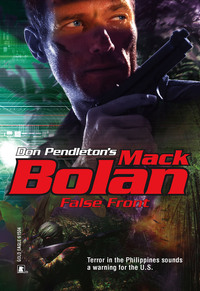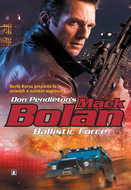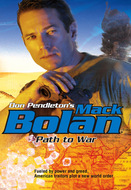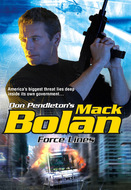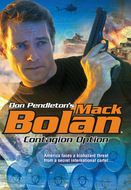Kitap dosya olarak indirilemez ancak uygulamamız üzerinden veya online olarak web sitemizden okunabilir.
Kitabı oku: «False Front»
The Executioner stared into the man’s eyes
“You aren’t a Tiger. Who are you working for?”
An evil smile curled the lips of the man on the ground. “You will never know,” he spit.
“What have you got planned for America?” Bolan asked. He could see that the man’s time was growing short. He’d bleed out in a few minutes. “What’s Subing going to pull off in the States?”
“That…I will…you,” the dying terrorist said, “because you…will never find him in time.” He paused, then breathed out one faint and final word. “Nuke.”
Charlie Latham looked at Bolan. “Oh, hell.”
Other titles available in this series:
Deadfall
Onslaught
Battle Force
Rampage
Takedown
Death’s Head
Hellground
Inferno
Ambush
Blood Strike
Killpoint
Vendetta
Stalk Line
Omega Game
Shock Tactic
Showdown
Precision Kill
Jungle Law
Dead Center
Tooth and Claw
Thermal Strike
Day of the Vulture
Flames of Wrath
High Aggression
Code of Bushido
Terror Spin
Judgment in Stone
Rage for Justice
Rebels and Hostiles
Ultimate Game
Blood Feud
Renegade Force
Retribution
Initiation
Cloud of Death
Termination Point
Hellfire Strike
Code of Conflict
Vengeance
Executive Action
Killsport
Conflagration
Storm Front
War Season
Evil Alliance
Scorched Earth
Deception
Destiny’s Hour
Power of the Lance
A Dying Evil
Deep Treachery
War Load
Sworn Enemies
Dark Truth
Breakaway
Blood and Sand
Caged
Sleepers
Strike and Retrieve
Age of War
Line of Control
Breached
Retaliation
Pressure Point
Silent Running
Stolen Arrows
Zero Option
Predator Paradise
Circle of Deception
Devil’s Bargain
False Front
Mack Bolan®
Don Pendleton

Whatever deceives seems to exercise a kind of magical enchantment.
—Plato,
The Republic, III, c.350 B.C.
There are two kinds of evil in this world—the kind that’s planned, reveled in and enjoyed, and the kind to which men who are otherwise good fall prey during weak moments. Many have been the victim of the latter. My mission is to obliterate the former.
—Mack Bolan
CONTENTS
PROLOGUE
CHAPTER ONE
CHAPTER TWO
CHAPTER THREE
CHAPTER FOUR
CHAPTER FIVE
CHAPTER SIX
CHAPTER SEVEN
CHAPTER EIGHT
CHAPTER NINE
CHAPTER TEN
CHAPTER ELEVEN
CHAPTER TWELVE
CHAPTER THIRTEEN
CHAPTER FOURTEEN
PROLOGUE
The smell was what he noticed first, a blend of old and new. At one time there had been cattle in the building and the scent of manure still lingered. Hay had been stored in the second-floor loft but it had molded away, leaving only its stench.
The scents of rotted wood and unwashed human bodies, however, were current. Old and new, the numerous odors combined to produce a smell far more nauseating than any one could have generated by itself and, as he stepped into the barn, the foul mixture hit Candido Subing like a baseball bat between the eyes.
Subing stopped just inside the door. One odor was separate from the others and seemed to rise alone above them. And it filled the air like a hanging corpse.
Fear.
Subing had caught the man following him off guard with his sudden stop and his fellow freedom fighter slammed into his back, the hard lens of the video camera the man carried cracking into his spine. Subing sent an angry glance over his shoulder, then turned his attention back to the six hostages huddled in the corner farthest from the door of the barn. Four men and two women were seated in the mud, their backs against the wall. Their hands were bound in front of them by a rope that traveled around their waists before dropping to secure their ankles. Makeshift hoods, which had once held grain for the animals who had inhabited the barn, covered each prisoner from the top of the head to the shoulders.
Subing felt his face twist into a sneer. The people beneath the hoods were worse than mere infidels. They were Christian missionaries, sent from the Great Satan America to infiltrate the Philippines and to snatch his people from the one true god, Allah, and his prophet.
Subing waded through the muddy floor to the cowering figures. He had no need to remove the hoods to know what lay in each prisoner’s eyes. Terror in some. Acceptance of their fate in others. But at least some hope still left in most of them.
And outright defiance in one.
Subing stopped in front of the seated captives. He had seen their faces earlier in the day when the hoods had been removed. As soon as their eyes had adjusted to the unaccustomed light, one of the women and two of the men had wept. Two other missionaries—a husband and wife—had closed their eyes and he’d seen their lips move silently as they’d offered up some infidel prayer. But none had dared to meet his eyes. At least, none but one. And that man still mocked him. Subing stared at that man now, his eyes filled with hatred.
Before he killed them—and he would kill them all, regardless of whether or not the Filipino and American authorities agreed to the demands he had put forth to them—he would force them each to denounce their false savior. He continued to stare at the hood over the face of the defiant one.
He would denounce his false doctrine this very day.
Subing narrowed his eyes, savoring this moment. The man who defied him sat between the two women. Worden was his name. The Reverend James A. Worden.
Subing waved the cameraman to his position in front of the hostages and the man began to unfold the legs of his tripod. Like the other hostages, Worden had been given many opportunities to renounce his false religion and embrace Islam. But he had refused and his refusal had kept the other, weaker-willed missionaries stalwart in their own faith. Two of the men, he suspected, would have denounced Jesus Christ as their savior had it not been for Worden’s strength. The husband and wife he couldn’t be sure about. They appeared to have some personal strength of their own. But at least their refusals had come fearfully, which meant that time might eventually wear them down. Worden, on the other hand, refused to convert with apparent joy in his heart. And as Subing stared at the ragged, mud-encrusted clothes and equally filthy hood that enshrouded the recalcitrant man, he knew that beneath the cloth James A. Worden was still smiling the same smile he always had on his face when his hood came off. And that knowledge infuriated him.
Candido Subing’s hand fell to the barong sheathed in the carved wooden scabbard at his side. In his mind he saw himself draw the short sword and bring its razor-edge down across the back of James Worden’s neck. Would he finally see fear in the American’s eyes as his head left his body and rolled across the ground? Would he see pain? Horror?
He didn’t know. But he was about to find out.
Subing sloshed his black combat boots two more steps forward in the mud and halted between the hostages and the video camera. The prisoners shifted uncomfortably, sensing his presence near them. Standing guard were ten of his fellow Tigers. He moved a step closer to the group, then turned his attention toward Reynaldo Taboada. The man was a new-comer to the Tigers, but he showed potential. Catching the man’s eye, he said, “Remove the hoods.”
Taboada looked hesitant for a moment, but Subing suspected the new man was merely nervous because of his presence. Subing’s duties took him away from this operation often and he had met Taboada only a few times before. In any case, after a moment’s delay, the man walked along the line jerking the dirty feed sacks from the heads of the prisoners.
All twelve of the infidels’s eyes blinked furiously as the unaccustomed light hit them. A few more tears rolled down three of the faces as they stared at the mud in front of them. The husband and wife team leaned closer to each other and began, once more, to pray.
But the Reverend James A. Worden turned his eyes immediately upward to Subing, and the same infuriating smile the Tigers’s leader had known would be there beamed out at him.
“Jesus loves you,” Worden said from his spot in the mud. “He will forgive you for all of this. All you have to do is ask Him.”
One of the guards stepped in to bring the stock of his AK-47 down on Worden’s shoulder and a loud crunching sound echoed off the rafters. Worden winced and, for a moment, the smile disappeared. But a second later it was back and Subing felt an almost uncontrollable urge to behead the man immediately.
It took all of his self-control to turn toward the cameraman instead. He saw that the video was now ready, clasped his hands behind his back and turned full toward the lens. The cameraman nodded. Subing nodded back. He heard the click as the start button was depressed. “We have done our best,” he said into the camera. “To reach an agreement with your leaders in America. For ten months now we have spared you, and we have not asked so very much in return. We have asked only that the United States release our brother patriots they keep captive and remove all troops from the Philippine Islands and the Mideast.” He paused, turning sideways now and addressing the missionaries themselves. “Our pleas have fallen on deaf ears. Your President does not care about you—he does not care if you live or die.” Pausing dramatically he said, “Or perhaps he does not believe we are serious.”
Turning once more to the camera, he scowled into the lens. “If the American President does not care about his people, there is little I can do. But if he does not believe I will carry through with my promises…” He let his voice trail off, took a deep breath, then said, “Then I must prove to him that I will.”
Twisting slightly, Subing nodded to two of the guards. They moved in next to the Reverend James Worden and hauled the man to his feet, dragging his bound legs through the mud to a spot directly in front of the video camera. One of the guards kicked Worden’s legs out from under him and the missionary fell facedown into the soggy earth. The other guard knelt, grabbed the man by the back of his hair and jerked him up to his hands and knees.
Worden’s mud-splattered face looked directly into the camera. And smiled.
Again pure rage and hatred rushed through Candido Subing’s body like a disease. He yearned to kill the insolent infidel now, without further delay. But he had carefully scripted his next moves to make the most lasting impression possible on the news agencies to which copies of the video would be sent. Improvisation would be counterproductive. He wanted the American people to see what he was about to do and to know that it had been done with little, if any, emotion.
America had become a nation of cowards who coddled the weak and took pride in being victims. His killing without emotion would frighten them far more than anger.
So, biting back the indignation in his breast, Subing gave the camera his own smile. He forced himself to speak calmly, “I am giving this man—this American Reverend James A. Worden—one final chance to renounce his false belief and embrace the true faith.” As he spoke, he pulled the barong from its scabbard. Then, raising it to his eyes, he glanced at the inscription on the blade: there is no god but Allah.
“James Worden,” Subing said, looking down at the still-smiling face beneath him, “I ask you now to repeat after me.” After a short pause he said, “There is only one god.”
To Subing’s surprise, the smiling face below him said, “There is only one god.”
“And Mohammed is his prophet,” Subing said.
“And Jesus Christ is His son,” Worden said.
Anger and hatred shot once more though Subing’s veins. And this time he couldn’t hold it back. Grasping the barong with both hands, he brought it up over his head, then down toward the back of the Reverend James A. Worden’s neck.
A geyser of blood shot out from the severed arteries to the brain, spotting the camera lens with crimson dots. Worden’s body stayed frozen on all fours for a second, then collapsed into the mud.
Subing saw the cameraman frantically wipe at the lens with a rag as he stooped forward to retrieve the bloody mass of flesh and bone from the ground. Grasping it by the tufts of hair at the front hairline, he held it up to the camera. Vanished now were his hopes of showing no emotion and he screamed, “America must release our brethren! American must remove all soldiers from our islands and all Muslim nations!” With a dramatic sweep of his free hand he indicated the shocked hostages behind him. “Or I will kill each and every one of them! Allah be praised!”
As Subing had ordered him to do, the cameraman panned the faces of the missionaries, pausing long enough to register each one’s dismay and horror before moving on to the next. Then he pressed the stop button and ended the recording.
Subing realized he had been holding his breath since speaking and finally let it out with a sigh. But when he looked down at the head dangling from his fingers, the sight caused him to suck in another sudden breath and hold it.
Reverend James A. Worden might be dead, but the smile was still on his lips. And it looked wider and more peaceful than it ever had in life.
CHAPTER ONE
The plane in the distance grew smaller, gradually becoming a mere speck in the sky before vanishing from sight altogether. Mack Bolan was alone, but such was almost always the case with the man also known as the Executioner.
Bolan looked down as he free-fell through the sky. Below he could see the deep blue waters of the Sulu Sea. Farther east lay the island of Mindanao, in the Philippines. In a moment he would open his parachute, but it would still be some time before he reached land. The Executioner had chosen a HAHO—High Altitude High Opening—dive both to avoid detection and to give himself room to maneuver the treacherous winds just north of the Sulu Archipelago. If all went as planned, it would take him approximately twenty minutes to reach the arranged landing zone where two already-on-the-ground contacts would be waiting for him. One was a CIA agent who had been trying to infiltrate the Liberty Tigers for several weeks. The other was a retired Delta Force special operations soldier who was also an old friend of another counterterrorist operative who worked out of Stony Man Farm.
Wind whipped at his face as the Executioner free-fell toward the white-capped waves below. Finally he grabbed the ripcord with his right hand, jerked, and the chute shot out over his head. Bolan watched as the canopy hit the end of the lines and saw that there was a problem.
It hadn’t opened.
As he continued to plummet, Bolan stared at the flat chute that some jumpers called a “Roman Candle.” Other parachutists referred to them as “streamers.” But no matter what you called it, the bottom line was that the canopy had failed. It looked like a long, limp dishrag or the tail on a child’s homemade kite as it followed him down through the sky toward certain death.
The Executioner’s jaw set tightly as he reviewed the pre-jump equipment check in his memory. Everything had been in place. Everything in order. Everything had checked out. So why hadn’t the canopy opened properly? He didn’t know. And probably never would.
Bolan continued to fall, forcing himself to stay calm, not a particularly difficult task for a man who had lived a life such as his. Remaining composed in the face of impending destruction had become second nature to him. He had stared into the dark face of the Grim Reaper many times and each time the man with the sickle had been the one to break eye contact and back down. Bolan had too much experience under his gun belt to be upset now.
To most men, the unopened chute would have been cause for panic. But to the Executioner, a primary canopy malfunction seemed hardly more dangerous than a bee sting.
The irony of dying from something so minor, however, was not lost on Bolan. A small grin broke at the corners of his lips as he was reminded that warriors were still human and that in addition to the extra dangers they faced they were still subject to all the hazards waiting to ensnare the normal man. General George S. Patton, Jr., had been killed in a car wreck. Colonel Rex Applegate had died of complications following an easily treated stroke. Bolan had known warriors who had succumbed to cancer and other terminal diseases. The truth was that warriors sometimes died like warriors. Other times they passed on in ways that seemed more befitting schoolteachers, accountants and stockbrokers.
Bolan spread both arms and legs to slow his fall. What had started out as a HAHO jump would now be turned into a mid-opener at best. He reached up to the harness at his left shoulder as, below, the whitecaps became more distinct. He could even make out several black spots that he assumed to be fishing boats. The island of Mindanao was still at least a mile in the distance.
Tugging the D-ring of the reserve chute, the Executioner glanced upward once more to see the streamer break free and fly off into space. That was the first step in the emergency procedure—to get the failed chute out of the way so it didn’t entangle the emergency canopy. Bolan counted—one…two…three—then saw the second canopy shoot up and out, blossoming into a life-saving orb that suddenly slowed his descent.
The Executioner had remained tranquil throughout the minor emergency. Still, he breathed a sigh of relief as he began to steer his way toward the landing site. He had work to do and it was that work to which his mind now turned.
As he floated through the sky, Bolan’s mind floated, as well—back to the telephone conversation he’d had only hours before with Hal Brognola, director of the Sensitive Operations Group at Stony Man Farm. The CIA had intercepted intelligence that a mammoth terrorist strike against the U.S. was imminent. Details as to exactly what, where, how and when were sketchy, but the chatter was that it would make September 11, 2001 seem like little more than a firecracker. What was clear was the “who.” Candido “Candy” Subing and his terrorist group, the Liberty Tigers of the Philippines, were planning the attack. A Filipino Moro-Muslim terrorist organization, the Tigers, as they were commonly called, had achieved notoriety during the past year by kidnapping six American missionaries. Just the day before, the major news networks had all received a videotape of Subing brutally murdering one of the hostages. An edited version had been aired throughout most of the world. Al-Jazeera, of course, had shown the entire gruesome ordeal.
The waves and fishing boats below him, and even the land in the distance, became more distinct as the Executioner sailed to the ground. At the same time, other distinctions filled his mind. First and foremost was the fact that much of the intelligence the CIA had about Candy Subing and his Tigers didn’t quite add up. Even before intercepting the intelligence from the CIA, Stony Man Farm had been monitoring the progress of a Filipino military force tasked with locating the hostages. But their attempt appeared halfhearted at best and so far their search had been unsuccessful.
Yes, Bolan thought, Candy Subing was a nasty little terrorist. But was he capable of any kind of major strike at the U.S.? Doubtful. The Liberty Tigers were simply too small and too limited financially to pull off such a thing. In the Executioner’s estimation the group simply didn’t have what it would take to carry out a large-scale strike on other side of the world. At least not without help. And there had been no mention of any of the other terrorist groups teaming up with them.
Finally over land, Bolan worked the toggles, steering the canopy. The failed primary chute had thrown him slightly off course, but not enough to worry him. He was still several miles north of Zamboanga, the southwestmost city on the island of Mindanao. He might not come down exactly where his ride was supposed to be waiting, but as long as he landed reasonably close, the men would easily spot him. If not, all Bolan needed to do was to make his way to the nearby main—and only—road that followed the coastline. His pickup would have no choice but to drive on it even if he gave up on finding him.
Bolan’s mind turned back to the captive missionaries. While their location was still a mystery, the CIA had finally learned that Subing himself slipped in and out of a small village near Zamboanga to visit his uncle. They had notified the President that they were about to send in a team of covert operatives who would do their best to take the Tigers’s leader alive, then pump him for information concerning both the hostages and the strike planned for America. If live capture proved impossible, Subing would be assassinated with the hope that the strike in the U.S. would end before it got off the ground.
Bolan shook his head as he dropped closer to the trees. The CIA plan had far too many ifs, ands and ors to suit the President. The Man in the White House had contacted Stony Man Farm and specifically told Brognola who he wanted on the job: the best. Mack Bolan. And he had ordered the CIA director to have only one agent link up with the Executioner—who would be going by the name Matt Cooper. The President had also made it clear who would be in charge, and it wasn’t the CIA.
Bolan looked down on the coastal area of Mindanao. Unless he was mistaken, he could see some kind of vehicle parked to the side of the road. A figure was getting out of the driver’s side and it looked as if he was wearing a hat.
THE MAN IN THE BATTERED straw cowboy hat pulled the Jeep Cherokee off the pitted asphalt, killed the engine and turned to face the thick foliage that paralleled the road. He reached into one of the pockets of his khaki cargo shorts and pulled out a round tin of chewing tobacco. Dropping a pinch of the finely cut substance under his bottom lip, he thought of mouth cancer for a moment, then pushed the troublesome possibility from his mind. Tapping the lid back into place, he returned the tin to his pocket.
Charlie Latham stared at the sky, watching the black speck he’d first spotted a few seconds earlier grow larger, finally dividing into two parts. As the dots continued to grow, he was able to discern the outline of both man and parachute. A frown creased his forehead as he sucked on the tobacco. He’d been told the jumper—a man he should call Matt Cooper—would have no trouble finding the clearing across the road. The guy was an expert skydiver.
But as he watched the sky now, Latham had to wonder just how accurate that evaluation had been. Considering the wind direction and the parachutist’s current positioning, it looked as though Cooper would come down at least a mile north of where he was supposed to land. And a glance at his watch made him wonder about the other man who was supposed to meet them here. A CIA agent named Reverte. Where the hell was he?
Latham twisted the key in the Cherokee’s ignition and the engine roared to life. After a quick glance in his rearview mirror, he pulled back onto the pothole-pocked asphalt the people of Mindanao called a highway. He drove slowly; he had plenty of time. Matt Cooper wouldn’t find his feet on solid ground for a good ten minutes or so.
Topping a rise, Latham saw another break in the trees, twenty yards off the road. A glance upward told him Cooper was maneuvering toward that spot to land. Latham lost sight of the clearing as the road dipped down but when he reached a point he guessed was directly across from it he pulled off the road and killed the engine again.
Latham glanced once more into the rearview mirror, this time to lift the weathered straw hat off his head. The leather sweat band came up off his scalp and he felt a quick rush of cool breeze roll over his closely cropped hair. It was a nice relief from the sultry Filipino heat and he almost dropped the hat onto the seat beside him. But the sun would beat down on his face and neck if he did, and besides, he was from Texas. The only time he’d ever felt right without a hat was when he wore a helmet. Football in high school. Then U.S. Army until a year or so ago.
Settling the hat back onto his head with a sigh, Latham reached into the back seat and grabbed a rusty two-dollar machete. He got out of the Jeep, crossed the road into the semi-thick vines of the coastal secondary jungle and lifted the long blade over his head.
A thin trickle of sweat ran down his cheek as he began slicing a path toward the clearing. The jungle canopy blocked his view of the sky, but he knew Cooper had to be nearing the site. It was the only open landing zone in the immediate area.
By the time he had cut himself into the clearing, Cooper was clearly visible in the sky. Latham was surprised to see that the chute beneath which the big man drifted was smaller than he would have expected for such a jump. In addition to the usual parachute gear, Cooper wore a huge backpack. Other equipment carriers were belted around his waist and strapped to his shoulders. Almost as quickly as his brain registered these details Latham was able to answer his earlier question as to why the man was so far off course. No, it wasn’t due to a lack of expertise as he had originally guessed. In fact it appeared that Cooper might be even beyond expert. At least the man knew how to keep his head in the face of danger. His main chute hadn’t opened and he was landing with the small reserve canopy. That was what had thrown him off course. He was loaded down like a pack mule and, considering the tricky winds through which he’d just come, the fact that he’d even survived with the small reserve chute gave him master-jumper status as far as Latham was concerned.
The Texan stepped out of the trees into the clearing and let the machete hang at the end of his arm. He suspected Cooper could see him by now. Even if he couldn’t, the big American would know someone was down here waiting for him by the sunlight shining off the large silver belt buckle that held up Latham’s shorts. As he continued to wait, the Texan chuckled silently at himself.
After retiring from the Army, the last ten years of which he’d been assigned to Delta Force, Charlie Latham had come to the Philippines to further pursue his life-long love affair with the Filipino martial arts. But he had brought a part of Texas with him and the unusual combination of clothing he wore was a pretty good indication of his bifurcated personality. The straw Stetson screamed Texas!, as did the Western belt and buckle. But the Philippines were just too hot for denim jeans and boots, so the rest of his attire consisted of a tank top, khaki cargo shorts and sandals. It was an unusual, eclectic image he projected, he knew, but he didn’t care. He was an unusual man—a mixture of nineteenth-century gunfighter and twenty-first-century soldier with a little bit of Eastern mystic thrown in. He saw no reason his clothes shouldn’t reflect that mix.
Latham’s mind jerked back to the present as Cooper landed expertly on his feet, rolled to his side, then popped back up to a standing position. In his mind, he gave the man an A-plus on landing to go with the high grade he’d already earned in canopy steering. The Texan could see now that, beneath all the equipment, Cooper wore some kind of skintight blacksuit that had to be hotter than his aunt Betty’s salsa. He grinned to himself as he walked forward.
He hoped the man had brought along some cooler rags. Finding anything to fit a guy his size in this land where a man who weighed 130 pounds and stood over 5’ 4” in height was considered a giant wasn’t going to be easy.
Cooper was already gathering up the chute by the time Latham reached him. He shifted the machete to his left hand and extended his right. Before he could speak, the big man turned his way and said, “You’re Charlie Latham?”
Latham nodded as he shook the hand. “And you’re Matt Cooper.” The handshake was firm and confident without being overly hard. Latham was glad of that. He got the feeling that had this guy wanted to, he could have snapped off several of his fingers.
Bolan released his hand and frowned, his eyes scanning the area around and behind the Texan. “Where’s the CIA man?” he asked.
Latham shrugged. “You got me. He hadn’t shown up at your original landing site by the time I saw where you were heading and left.”
Bolan nodded. “Something may have delayed him. We’ll check the spot on the way back.”
“Sounds good to me,” Latham said. He reached to the ground and lifted two of the heavy equipment bags the parachutist had shrugged out of when he’d hit the ground. “Ready to do it?” he asked. “Sounds like it should be fairly easy.”
Bolan hoisted the rest of his gear. “Yeah,” he said. “To be honest, it sounds too easy.” He let the Texan take the lead and followed the man along a recently cut path through the trees. Walking single file as they were wasn’t conducive to conversation and both men lapsed into silence as they dodged branches and vines. Left to his own thoughts, the Executioner found himself questioning certain aspects of the mission once more.
He still hadn’t gotten over the fact that there were parts of the CIA intelligence reports that didn’t make a lot of sense. One of them was how easily Candy Subing could be located. If the man slipped in and out of Zamboanga all the time as the CIA believed, why hadn’t the Filipino search force already grabbed him? Better yet, why hadn’t they put a tail on him and followed him back to where the missionaries were being held? The CIA even had an address for Subing’s uncle. So what, exactly, had this CIA man—Reverte was his name—been doing over the past few weeks? For that matter, where was the man now?
